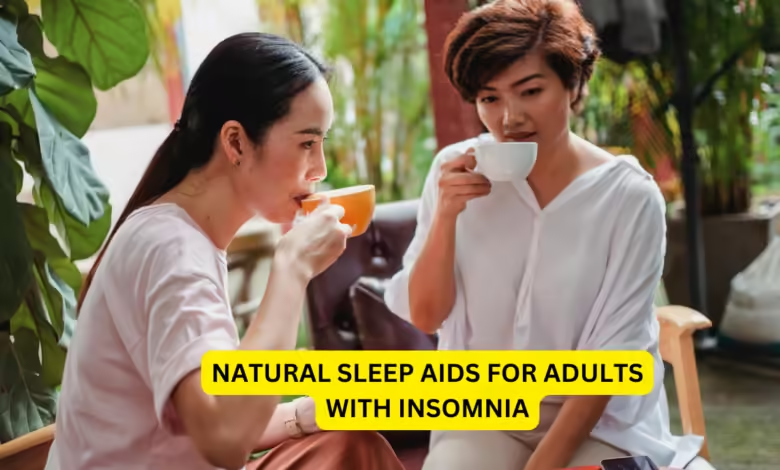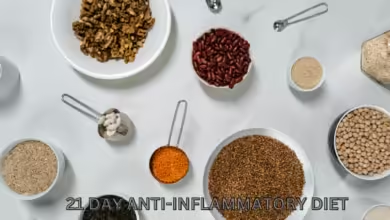Strongest Natural Sleep Aids for Adults with Insomnia

Natural sleep aids for adults with insomnia: While sleep is an important factor in general health and well-being, millions of adults can neither fall asleep nor maintain sleeping through the night. Many resort to prescription medications that sometimes work quickly but have unwanted side effects and conditions of dependence. There are so many natural sleep aids for adults who are suffering from insomnia, and yet there is a hope for a more natural and holistic means to achieve restorative sleep. This article focuses on some highly effective natural remedies that can promote better sleep without the usage of pharmaceuticals.
Understanding Insomnia
The CDC mentions that there are almost 70 million Americans who are affected by insomnia, and almost all of these people confirm that falling asleep and staying asleep is difficult, while many feel they wake too early in the morning. Current lifestyles, characterized by stress and anxiety, increased exposure to screen, and other forms of irregular sleep patterns, generally tend to exacerbate insomnia. Chronic sleep deprivation leads to reduced immunity, diminished cognitive function, immunity weaknesses, and mental illnesses, such as anxiety and depression.
While drugs may find a way to the solution in the short-term sense, natural sleep inducers aid and treat at the source of the condition, which is insomnia and not the symptoms.
Natural sleep aids for adults with insomnia overview
1. Herbal Supplements for Insomnia
Herbal sleep supplements have been with humanity for many years in curbing insomnia. One has to understand that these plants contain compounds that help quieten the nervous system, have less anxiety and thus sleep.
Valerian Root
Valerian root is probably one of the most studied herbs regarding sleep; hence it is a good herb to use in the treatment of insomnia. Some studies report that it helps a faster sleep onset and better sleep quality at night as well as lower rates of wakening at night. It works on the brain by increasing the levels of gamma-aminobutyric acid (GABA), which calms the nervous system.
Valerian Root Available in capsule, tincture, or tea form, it can be taken an hour before going to sleep. It may take two weeks of continuous use to see full benefits, but it’s generally considered safe and non-habit-forming.
Chamomile
One of the most widely used herbal medicinal treatments is chamomile, so soothingly calming and anti-anxiety. Of all teas, one is even more mild: the sleep aid. Relaxed muscles, relieved stress, and improved sleep for nights; this is what the substance apigenin in chamomile does. It attaches to receptors on the GABA receptors in your brain, promoting relaxation and causing you to fall asleep.
Drinking a warm cup of chamomile tea 30 minutes before bed can become your soothing bedtime ritual, helping cue your brain that indeed it’s time to wind down.
Passionflower
Passionflower is a classic herbal remedy for anxiety and insomnia. In addition to valerian, passionflower also enhances the levels of the inhibitory neurotransmitter GABA, calming the brain. Passionflower may be particularly useful for people whose sleep disorder is anxiety or racing thoughts-related.
Used as a tea, tincture, or supplement, passionflower is commonly used with valerian root or other sedatives to enhance sleep promoting effects.
2. Melatonin: The Sleep Hormone
Melatonin is the hormone that helps regulate our sleep and wake cycles. It’s produced within the gland of the pineal, in response to darkness. For most adults who have trouble sleeping-mostly those whose sleep-wake cycle has been disrupted by travel, shift work, or irregular sleep schedule-supplemental melatonin can be very useful.
Melatonin for Short-Term Use
Melatonin is better suited for short-term, acute purposes and for specific uses like overcoming jet lag or shift work. A minimal dosage of 0.5 mg to 3 mg is advised around 30 minutes to one hour before retiring to bed to promote improved sleep.
Melatonin can induce sleep; however, its prolonged use is not advisable because it also suppresses the synthesis of its body-produced natural version.
3. Magnesium: The Sleep-Boosting Mineral
Magnesium is an essential mineral that plays a role in more than 300 biochemical reactions around the body, including muscle and nerve function regulation. It also plays an important role in the regulation of sleep. A lack of magnesium has been associated with insomnia, anxiety, and restless sleep. Supplementing your body with magnesium will help soothe the nervous system and calm your body to go to sleep at night.
Magnesium Glycinate for Sleep
Magnesium glycinate is, probably, one of the best forms of magnesium for sleep. It is readily absorbed by the body and, at the same time, provides a calming effect with no gastrointestinal complications. This can help to relax muscles and thus relieve tension. So people may report better, more restorative sleep when using 200-400 mg of magnesium glycinate before sleeping.
4. Essential Oils for Sleep
Another natural remedy for good sleep is aromatherapy. Aromatherapy helps in reducing anxiety and thus makes the mind feel relaxed. Some of the common essential oils available in the market include lavender, chamomile, and cedarwood.
Lavender Essential Oil
Perhaps one of the most recognizable essential oils, lavender is arguably popular for sleep. Its fragrance is very sedative and stress relieving, thereby great in helping one relax and induce drowsiness. As a matter of fact, studies had proven that inhaling lavender oil or applying its usefulness to the skin before sleep can dramatically improve quality sleep and even reduce the time taken to fall asleep.
You can diffuse lavender essential oil, put a few drops onto a pillow, or blend it with a carrier oil and apply behind your ears or your wrists right before sleeping.
Cedarwood and Vetiver
The two other essential oils that are good at promoting sleeping are cedarwood and vetiver. Cedarwood helps to stimulate the production of melatonin and vetiver grounds, which can be helpful for somebody whose mind is racing at night.
Use a few drops in a diffuser or with lavender oil in creating a peaceful sleep environment.
5. Lifestyle Changes and Sleep Hygiene
Thus, proper sleep hygiene is also required to cure insomnia, besides natural sleep aids. Sleep hygiene is basically the habits and practices meant to enable healthy sleep patterns.
Establish a Consistent Sleep Schedule
Your internal body clock, or circadian rhythm, feeds off routine. Going to bed and waking up at the same time every day is helpful to form these sleep patterns and to help get to bed at night. Naps, unless absolutely necessary, can interfere with nighttime sleep especially if taken too close to the late afternoon.
Create a Relaxing Bedtime Routine
A calming pre-bed routine signals to your body that it’s time to wind down. Avoid screens and stimulating activities at least an hour before bed, as the blue light from electronics can disrupt melatonin production. Instead, read a book, listen to soft music, or practice relaxation techniques like meditation or deep breathing.
Limit Stimulants and Heavy Meals
Caffeine and nicotine, and heavier meals, for that matter, can also cause an interruption in sleep patterns if consumed within bedtime. Caffeine stays in the body for many hours so one should avoid any consumption after the afternoon. I suggest light grazing if you are hungry to retire to bed rather than a heavy meal, and those things to be avoided should also never be spicy or acidic since they may cause indigestion.
Conclusion




